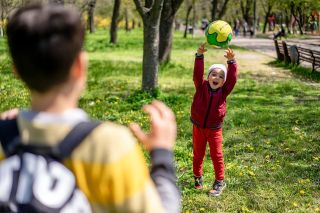Child Development
How Recess May Help Your Child's Resilience
New research emphasizes the role of exercise on children's emotional well-being.
Updated September 26, 2023 Reviewed by Ray Parker
Key points
- A new study found physical activity can help children to be more resilient to stress.
- The study was correlational; it cannot prove cause and effect. More research is needed.
- Physical activity is important for children's physical and mental health.

With reports of youth mental health problems on the rise and indications that American schoolchildren are getting less and less unstructured play and physical activity, it's worth examining whether these two issues are feeding into each other.
A recent study led by Manuel Hanke and Sebastian Ludyga from the Department of Sport, Exercise, and Health at the University of Basel has attempted to do just that.
Many of us have known for years that physical exercise is good for physical and mental health, no matter what your age. However, this latest study set out to examine the specific interaction between physical activity and a child's resilience, while they endured stress-inducing situations.
For a week, the research team followed a group of children between the ages of 10 and 13, having them wear a tracker that monitored their physical activity, and categorized 110 of those children into groups of either low or high physical exercise. The group deemed to have lower exercise got less than 30 minutes per day of moderate-to-vigorous physical activity, and the "higher" group got more than 60 minutes per day.
The children were then brought to the lab twice to complete a task, either stress-inducing or not stress-inducing. The stress-inducing task was the Trier Social Stress Test for Children (TSST-C), a test reliably shown to induce stress by making someone perform an interview-style presentation and surprise mental arithmetic task in front of others, without any support or positive feedback. (It's reliably shown to induce stress in adults as well.) There was also a control task that was not stress-inducing.
The stress reactivity of participants was measured from their levels of the stress hormone cortisol before and during the test, and heart rate variability, along with self-reported measures of anxiety.
Though no differences in heart rate variability were found, cortisol levels in the stress-inducing task depended on how much physical exercise a child had gotten over the week. Specifically, children in the higher physical activity groups had less cortisol reactivity during the TSST-C, as compared to those with lower physical activity.
So it can realistically be said that the children who got higher levels of exercise were less stressed during the task, and more resilient to the effects of the anxiety that such a task would typically produce.
Of course, this is merely a correlational study: Children were grouped in the high-versus-low exercise categories by what they were already choosing as behaviors for themselves. They weren't assigned to seek out more or less physical activity, so this study can't establish that getting more exercise caused their cortisol levels to be less reactive.
It may be that children who are naturally prone to less exercise have higher stress reactivity. Moreover, it could be that there is some other variable altogether that accounts for both the exercise levels or resilience to stress, connecting the two in a way that makes the exercise levels not directly responsible for the different levels of stress resilience.
Nonetheless, with research showing positive mood boosts that come from exercise, it is reasonable to be optimistic that children who get more exercise are getting mental health benefits because of it. And this study is an important first step in quantifying what those differences might look like.
While many school districts are increasingly tempted to cut back on physical education and recess to make more room for academic testing, the potential drawbacks of those actions need to be taken seriously, as they may have meaningful detrimental effects on children's well-being.
References
Manuel Hanke, Vera Nina Looser, Fabienne Bruggisser, Rahel Leuenberger, Markus Gerber, Sebastian Ludyga. Moderate-to-vigorous physical activity and reactivity to acute psychosocial stress in preadolescent children. Journal of Science and Medicine in Sport, 2023; DOI: 10.1016/j.jsams.2023.07.010


